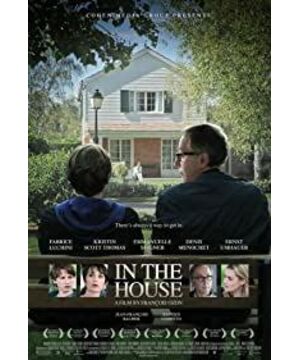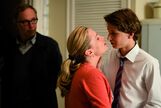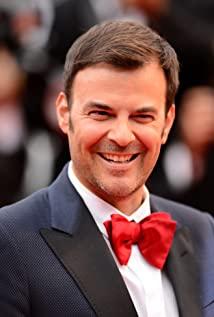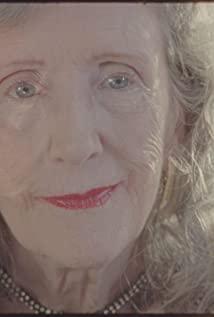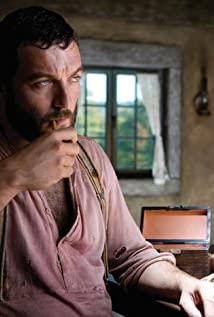"Dans la maison" by François Ozon is a wonderful film with an aftertaste. Ingeniously integrated with text creation, the film is full of connotation due to literary factors, and the literary creation in the film is full of vivid charm due to the expression form of the film. At the same time, the film also contains some taboo factors. The rich personal experience or indirect "reading" constantly challenges the bottom line of people's desire and morality in the film. Whether it is voyeurism and exploration, or fantasy and experience, Ou Rong combines voyeuristic literature with real life. It is not unreasonable to be selected as one of the best movies of the year in Europe.
The film is adapted from the Spanish stage play "The Boys in the Last Row". In the process of light and shadow, Ou Rong's considerable directing skills make the film always show a high-end temperament with ease. At least Ou Rong is a storyteller. He presents a seemingly obscure and rigid academic story with flavor, and makes the story and even the stories nested in the film advance with a sense of layers, and each layer is not flat, it is complex and varied, making the audience feel I feel a rich sense of fluidity when watching the movie, which is very enjoyable. The changes in the attributes of the characters in the film are also worth pondering. The storyteller is both the creator and the person in the story, and one of the "readers" who should have been on the sidelines is because he is a literature teacher and has a creative passion. , also participated in this bizarre creation, and even broke the professional bottom line in order to trigger the so-called progress or conflict.
Nothing can stimulate the hidden side of human curiosity more than peeping into the private life of others. If the film is only regarded as a film reflecting voyeurism and writing, it will be a bit wronged. Philip Pullman said: "The best stories are like this: it's too simple for children, but too complicated for adults." There are many intertwined content in the film, such as the obvious Oedipus complex of loveless teenagers, love The father complex, the mutation of the individual behavior of the fanatical literary creation. Another example is relatively obvious, the comparison and analysis of the life of the two middle-class families are in the midst of transformation, and the women are in a subordinate and neglected position. The result is a maintenance and a disintegration. The French teacher, Mr. Gilman's demand for a son, although it seems not so strong, is actually expressed in the progress of the plot. As for the so-called same-sex complex and the emotional direction at the end of the film, it is open-ended and free to think.
Fabrice Ruccini, who plays Mr. Gilman, portrays the eccentric and hidden nature of the disgruntled writer as he pursues his middle school career. In the film, it is said that "because he is not talented enough, he is eccentric". In essence, he is also a self-admiring and self-centered type. At the same time, he has a cute and funny side, especially criticizing the uniform school uniform and the correction of students' writing. When the bad weekly diary. And the talent shown by Claude, a student who is good at mathematics, in the weekly diary, let Mr. Gilman find a glimmer of hope in the hopeless boredom, and lit up his quiet and latent enthusiasm for literary creation. Faculty ethics seem less binding when there is not much rationality.
The student Claude, played by Ernst Ummer, always has a wicked smile on the corner of his mouth. He shows the scheming and emotional eccentricities of a special teenager from peeping fantasies to entering the room to classmate Raphael's house. The film also reflects the coordination and unity of the arts and sciences in him. He is good at mathematics, he is rational, and at the same time he has excellent literary talent, he is emotional, and most importantly, he is good at observation, good at conception, and good at himself. The virtues, he knows how to use people's curiosity to gradually master them. Claude was once wounded by literature, thinking that "mathematics at least never disappoints", but he was also able to let inspiration leap on paper and write the sentence "even if you are barefoot, the rain can't dance". What is interesting is that Claude entered Raphael's house on the grounds of tutoring mathematics, and he made emotional things like story creation with such a rational entrance.
The overall performance is well-balanced by Kristin Scott Thomas' ease in the role of Gilman's wife, Jenny, and the situation of this seemingly career and independent middle-class woman. In fact, it is comparable to Raphael's mother, Aster who is at home all day pondering how to decorate her room. As another reader of the weekly diary, Jenny saw herself by peeping into Aster's life and became Claude with ulterior motives. When she told her the reason why the Esther family was able to continue, Jenny was in pain and woke up completely.
There are a lot of punch lines about how to write in the film, such as, "It's easy to expose a person's negativity. When you have a superior mentality, you will naturally ridicule your character. The hardest thing in writing is to be silent. Get close to your character, without making any premise, without making any judgment.” Another example, “Literature is to record the truth of life. We always have a way to enter the room and enter the lives of others.”
The continuation of the road of literary creation at the end of the film makes people feel Mixed joys and sorrows, such an ending is reminiscent of Mr. Gilman's words in the film: "A good plot is a smooth progress, and then abruptly stopped." The master and apprentice faced an apartment, guessing the structure and telling the story of each The story behind this window is reminiscent of the words of Barbara Grizzuti Harrison: "All action in the world begins with an idea." Without an idea, such a play would not exist.
(Magazine request)
http://nicolew.blog.hexun.com/86505087_d.html
View more about In the House reviews


